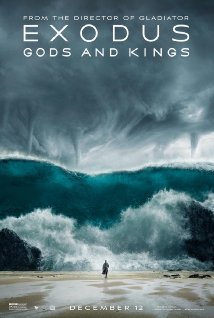“Spotty Biblical Epic”

| None | Light | Moderate | Heavy | |
|---|---|---|---|---|
| Language | ||||
| Violence | ||||
| Sex | ||||
| Nudity |
What You Need To Know:
The good news about EXODUS is that the filmmakers keep away from gory, bloody violence, although there is plenty of action adventure and scares. The best part of the movie is the battle scenes. The movie’s theology is weak, but God is still the hero. Sadly, the movie suffers mostly from poor dramatic setup and a lack of depth and proper character arcs. MOVIEGUIDE® advises caution for older children.
Content:
(BB, C, VV, M) Strong God-centered, moral worldview with some redemptive elements about Moses going from an atheist to a servant of God, with the false god of Egypt renounced, with confusing representation of God by a young boy who could just be a messenger of God, an angel or a young Jesus, but this is not necessarily theologically aberrant (see our complete review); no foul language; strong action violence with big battle scenes, animal sacrifice, plagues, drowning, but never excessively bloody or gory; no sexual activity except Moses gets married, and he and his bride pledge their love for each other, and he starts to loosen her hair before the camera cuts away, and they repeat the same promises and action at the end; upper male nudity from slaves to Egyptians, but never exploitive or the focus of attention; no direct alcohol use; no smoking or illegal drugs, but Ramses milks the venom of cobras so he won’t die from any venom later from a would-be assassin and the leeching of the Pharaoh when he gets sick; and, several people in the court of Ramses undermine Moses with lies and try to cheat Pharaoh.
More Detail:
The movie opens with the title that it’s 1300 BCE, Before the Common Era, which means of course Before Christ. The title credit continues that the Jews have been in Egypt for 400 years and have reduced to slaves building the Pharaoh’s empire, but, the title says: God has not forgotten them.
Soon, a young man, Moses, and his adoptive brother, Ramses, are being told that the Hittites are invading Egypt. An Egyptian priestess looks at entrails out of goose and says that one will rescue the ruler and the other one will become a ruler. Moses thinks this is hogwash and says as much. He doesn’t believe in prophecies, superstition or the priestess’s mumbo jumbo.
The Pharaoh trusts Moses more than his own son, Ramses. Moses travels from Memphis to the slave city of Pithom, where the Egyptian viceroy Hegep is living in luxury at the expense of the slaves. Moses tells the viceroy he should talk to the slaves to find out why they are so upset. Hegep won’t do that, however, so Moses talks to the elders of the slaves, and one of them, named Nun, tells Moses in secret the true story of his birth, which means that Moses is really Hebrew.
The viceroy sends two officers to kill Moses, but Moses kills one of them and wounds the other. The viceroy also sent spies who come back and tell him the story of Moses’ birth.
When Moses gets back to Memphis, the Pharaoh is dying. At his death, Ramses takes charge. Ramses builds gigantic monument statues of himself. The viceroy Hegep comes and tells Ramses about Moses birth and Moses killing the guard. Ramses banishes Moses.
After almost dying in the desert, Moses finds Jethro and Jethro’s daughter, Zipporah. Moses marries Zipporah, and they have a son. Nine years later, Moses is confronted by the angel or messenger of God at the burning bush. (in Hebrew the word for angel “malakh” primarily means messenger.) The messenger tells him to rescue God’s people. Moses asks why He waited 400 years, but the messenger, who could be a theophany or visible manifestation of God, doesn’t answer. The messenger, by the way, is a young boy.
Moses tells his wife and son he has to go back to Egypt to set God’s people free. When he gets there, Ramses will have no part of it. God brings the plagues on Egypt, but Ramses still refuses to set the Hebrews free. After the supernatural killing of the firstborn Egyptians, Ramses finally sets the Hebrews free. Moses leads them to the Red Sea. Tremendous special effects occur. The rest is history, including God giving Moses the Ten Commandments on the mountain.
For all of those readers concerned about the theology of Exodus, God is the real hero of EXODUS the movie. Thus, in the movie, God does use Moses to set the people free. However, the messenger of God is a young boy, who may or may not be God Himself. Before jumping to inaccurate theological confusion, it must first be noted that in Colossians 1:9 and elsewhere in the Bible, it says that the only physical manifestation of God is Jesus, who is fully God and fully man. Thus, for those who want an old God played by some famous thespian, Jesus came as a baby, who was of course fully God and fully Man. So, without resorting to the aberrant developmental, progressive theology of the some 20th Century theologians, there has been orthodox theological discussion about the appearances of Jesus and the incarnation, and in the Bible, God incarnated as Jesus grows from an infant through boyhood to manhood.
Also, note that at the Transfiguration of Jesus (Matthew 17:1–9, Mark 9:2-8, Luke 9:28–36) when Jesus is transfigured and Peter, James and John see Jesus talking to Moses and Elijah. If Jesus is in charge of time and space, what Peter, James and John saw in the Transfiguration could have been happening outside of time and space. However, this is theological speculation.
In other words, the movie can be interpreted in a positive way, and Christians should not retreat into a posture of being negative nabobs by attacking the movie EXODUS unfairly. That said, the story has been much better done in THE TEN COMMANDMENTS and THE PRINCE OF EGYPT where MOVIEGUIDE®’s Founder and Publisher, Dr. Ted Baehr, brought in prominent theologians to keep the movie’s theology on track.
Thus, although some people will complain about how Ridley Scott visualized and dramatized the story’s supernatural aspects, the real puzzle and most annoying part of the movie is the clunky, clumsy dramatization throughout the movie. Since MOVIEGUIDE® knows some of the filmmakers, who are Christian and have done some great movies, it’s perplexing why the story of Exodus is so badly told in this movie.
In good storytelling, you set up events just like you set up a good joke. The filmmaker has to promise and then deliver what he promises. The Bible does just that in the story of Exodus. God tells Moses what’s going to happen, and then the reader waits with great expectation until it happens the way God said it would.
In the movie EXODUS, Moses does not tell Pharaoh that he has to let the people of Israel go free or the plagues will incur such as: the water will turn to blood, and the frogs and then the locusts will plague Egypt. The plagues just pop out of nowhere, unless you know the biblical story. Perhaps Ridley thought that everyone knows the story so well that they will know what is about to happen and experience jeopardy through precognition. Even so, however, when Moses does warn Ramses about the impending death of the firstborn unless Ramses sets the Hebrew people free, there is some sense of jeopardy in the movie.
Another puzzling dramatic deficiency about EXODUS: GODS AND KINGS is the lack of depth and character arcs for each of the major characters. One can excuse Christian Bale for being wooden, but Ben Kingsley is a great actor and quite often he looks lost in the movie as the Jewish elder, Nun. So, the movie gets quite tedious instead of being emotionally satisfying.
So, some people fell asleep during the screening, even though they weren’t tired. This is not a good sign.
The Good News about EXODUS is that the filmmakers keep away from gory, bloody violence, although there is plenty of action adventure and scares. The best part of the movie is the battle scenes. Ridley Scott and Fox said they wanted to make the story of Moses like GLADIATOR. In some ways, they’ve done that, but GLADIATOR was a much better scripted movie. Unlike GLADIATOR, EXODUS has some goofy parts that are just plain weird, such as when Ben Kingsley is wandering around looking for direction or when biblical events are compressed into meaninglessness such as the giving of the Ten Commandments and the golden calf, or when Ramses survives the Red Sea deluge, but his men do not.
In the final analysis, therefore, what the Christian community and others of faith and values, including Jews, should do is help people understand the true story of how God set His people free. Reading the Bible after seeing EXODUS was thrilling. So, be prepared to hand out copies of the Bible or just the Exodus story. Time and again MOVIEGUIDE® receives correspondence from people who want to know the rest of the story. EXODUS: GODS AND KINGS is a great opportunity for those who love the story of Exodus to tell their friends and loved ones the rest of the story.
By the way, many people (including Christians and Jews) will try to psychoanalyze the filmmakers and the actors, but speculating on their decisions and comments is a futile exercise. The movie is what it is, and what it is, is a great opportunity to tell the story about how God wants to set each and every person free.


 - Content:
- Content: 



